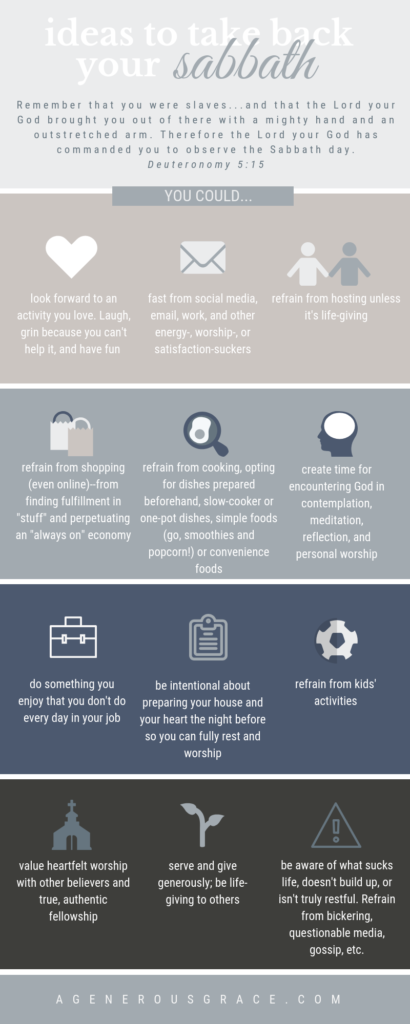Most of the things we need to be most fully alive never come in busyness. They grow in rest.
Mindset of the man too busy: I am too busy being God to become like God.
Mark Buchanan, The Holy Wild: Trusting in the Character of God
 It was a couple of years ago that we curled on my porch, a friend and me, legs stretched out in the warmth of the afternoon. She was in university, but the load, she explained, was overwhelming. There was far more to do than there was time.
It was a couple of years ago that we curled on my porch, a friend and me, legs stretched out in the warmth of the afternoon. She was in university, but the load, she explained, was overwhelming. There was far more to do than there was time.
Was she getting any time off? I asked.
Nope. She was even working through Sundays.
I’m sure I crinkled my face for a look that said, You’re not gonna like this. But I suggested gently she try something: Taking a Sabbath.
I knew it didn’t make sense. Work less to do more? Riiiight.
But when we checked in with each other a few months later, she was practically effervescing with the change. Finally, she was getting rest. Finally, she was enjoying life again. “And I’m taking a Sabbath!” Her face looked like it could have spun a cartwheel.
When Life-burnout is Real
Having young kids brought my need for a day off to a head. I actually prickled with anger. It felt like everyone else got a day off but me. Naptime on Sunday felt like the only time my kids stopped needing—and that was if I could get all four of them down at the same time. Mommy-burnout was real.
So I started making some no’s in my life—not for them, but for me. One weird one I set in place (now obsolete): to not empty the dishwasher. At first, it drove me nuts as they all piled up in the sink, crusty and goopy. But that little concession of messing with the dishwasher all over again felt like my day off was no different than any other day: Get it done. Go! Go! Go!
I also started prepping so I wouldn’t cook on Sundays, and not host. It could be smoothies and popcorn for dinner, or maybe we’d grab a cheap pizza. But no cooking meant less dishes, less time, same family connection. And somewhere in there, I discovered the joy of the nap. Even if we were at my mom’s, I would skip game time and sack out on the sofa. To this day, reading until I fall asleep on a Sunday is a luxury I look forward to all week.
The Sabbath Connection
And here’s what I realized: God connects himself with rest—with finally. Stopping. Working. His day was the day he rested. And in Hebrews, it amazes me that he associates “Sabbath rest” with the rest we have from working toward our own self-salvation.
There remains a Sabbath rest for the people of God, for whoever has entered God’s rest has also rested from his works as God did from his.
Hebrews 4:9-10
And when he first tells the Israelites about the Sabbath? He says in effect, You used to be slaves. You’re not anymore. You can take a day off. So celebrate the fact that I worked this crazy miracle among you.
See what God’s been doing? In the New Testament, we see this is a precursor for what Jesus did—finally saying My work is enough. You’re not a slave to sin anymore or to working for God’s approval. In the Sabbath, God superglues rest…to grace.
In some ways, the whole point of the Exodus was Sabbath. Let my people go, became God’s rallying cry, that they might worship me. At the heart of liberty—of being let go—is worship. But at the heart of worship is rest—a stopping from all work, all worry, all scheming, all fleeing—to stand amazed and thankful before God and his work. There can be no real worship without true rest.
Mark Buchanan, The Rest of God: Restoring Your Soul by Restoring Sabbath (emphasis added)
So that’s just one more reason rest matters. It says, I am not what I do. I am accepted by God apart from my work. Like tithes, it works the opposite of what we’d expect. We think giving means I have less. We think resting means I work less. But just as God “open[s] the windows of heaven” (Malachi 3:10) when we give, our work multiplies when we submit ourselves to the faith that is a Sabbath.
The “Y” (and Why) behind the No
I found in Africa that practicing Sabbath requires a deep self-knowledge. There are activities that don’t really replenish us (even if we’re not doing anything), restful activities, and rejuvenating activities. Those differ for every person. My husband rejuvenates with sports; rests with good movie. Movies, for me, are often idle; sports and working out will never (ever.) be restful. My mom loves hosting the family, which I find rejuvenating on a weeknight, but not restful for a Sunday.
Our carefully thought-out no’s are really just a big yes to the things that give us life. So I appreciate Mark Buchanan’s differentiation, as you consider what “no’s” you could say to protect this day made for us.
Sabbath…is a reprieve from what you ought to do, even though the list of oughts is infinitely long and never done.
Oughts are tyrants, noisy and surly, chronically dissatisfied. Sabbath is the day you trade places with them: they go in the salt mine, and you go out dancing. It’s the one day when the only thing you must do is to not do the things you must.
You are given permission— issued a command, to be blunt—to turn your back on all those oughts. You get to willfully ignore the many niggling things your existence genuinely depends on—and is often hobbled beneath—so that you can turn to whatever you’ve put off and pushed away for lack of time, lack of room, lack of breath. You get to shuck the have-tos and lay hold of the get-tos.
Mark Buchanan, The Rest of God: Restoring Your Soul by Restoring Sabbath (emphasis added)
What could you get to say no to?
Here: A few ideas you could–not should!–do to say some happy no’s. (Print ’em here!)
Like this post? You might like
In praise of Sabbath: On letting go
The True Cost of Overcommitment
Memos to myself: On the dangers of overcommitment
INFOGRAPHIC: Simplify Your Schedule (in Time for the School Year!)








